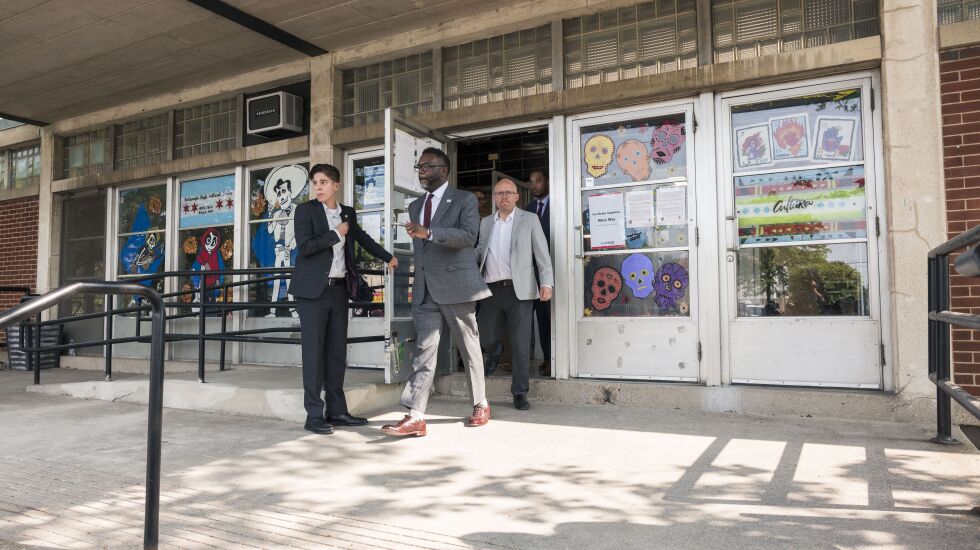
Brandon Johnson spent part of his first full day as mayor Tuesday visiting asylum-seekers who have been sleeping on the floor of the 12th District police station and others staying at a temporary shelter in Little Village, saying he needed to see the crisis “first-hand.”
“It is clear that police stations and respite centers is not the goal,” Johnson said to reporters after touring the temporary shelter at Piotrowski Park, adding that it’s going to take a collaborative effort to tackle the emergency.
“We have to make sure that the work that is being done here is done with the true spirit of Chicago,” Johnson said. “Where the philanthropic community, our local elected leaders, our community-based organizations, our public facilities are all working hand in hand to make sure that these families who have travailed through very horrific conditions, that when they arrive here that the city of Chicago and the people of Chicago we’re going to be here for these families.”
Johnson, without mentioning anyone by name, called out politicians “that are using the lives of individuals as a way to score some political points with a certain segment of the population in this country. It’s wicked, it’s unconscionable.”

Since last August, when Texas Gov. Greg Abbott began busing asylum-seekers at the country’s southern border out of his state, more than 8,000 immigrants have arrived in Chicago.
With a dearth of beds to house the new arrivals, many migrants have had to find shelter in the lobbies of police stations. Before touring the temporary shelter at Piotrowski Park, at 4247 W. 31st St., on Tuesday, the mayor visited the 12th District police station on the near west side, where about two dozen migrants are staying.
Several migrants were sitting outside enjoying the nice weather, unaware that the newly installed mayor was going to pay them a visit. “Does he like immigrants?” one of them asked. Another said they’ve been treated well at the station and that police officers have been kind to them.
Johnson shook hands with several people inside the station, telling them he was “grateful” they were here and assuring them that “we are going to do everything we can to make this home for you.”
Ald. Byron Sigcho-Lopez, whose ward borders the police station, accompanied Johnson on his visit, translating for the mayor. One of the asylum-seekers told Johnson the city was “beautiful, like in the movies.” They thanked him for being there and for offering his support.

The city of Chicago is in line to get $4.3 million in federal funding to help with the influx of immigrants. But that’s far less than the $38.9 million to $66.7 million the administration of former Mayor Lori Lightfoot requested from the Federal Emergency Management Agency’s emergency food and shelter program.
Johnson said finding resources in several levels of government to continue to help the immigrants was going to be a collaborative undertaking, and he says he’s had conversations with leaders at the federal level on the issue.
“I was in Washington, D.C., last week having this very conversation,” Johnson said. “Had very effective, meaningful conversations with our two senators, as well as our congressional delegation. Everyone recognizes that the city of Chicago has been a real model and an example of how we treat people. Working at every single level of government, the county, the state and the federal level for resources, that’s going to be all of our collective work.”
Respite shelters like the one at Piotrowski Park serve as temporary housing for asylum-seekers while organizations work to secure permanent beds for them. Local Ald. Michael Rodriguez said the shelter at the park can accommodate 150 to 200 migrants and that it was not yet at capacity.
The city plans to turn a former high school in South Shore into a respite shelter, but local residents have voiced fierce opposition to the move.
Several filed a lawsuit against the city seeking to block the plan from moving forward. They say the funds being spent to house migrants should be used to address chronic issues like gun violence and homelessness in their neighborhood and other majority-Black areas of the city, which have been historically starved of resources.
But Johnson said the city can work toward solving both issues simultaneously.
“We can do both, and I am committed, and I’m confident that there’s an entire coalition of individuals that are committed to having these conversations,” Johnson said. “It’s no secret that the Black community in this city has suffered under austerity budgets that have caused true economic disparity, and we are in a position now to bring communities together, and we have to do both. We have to make sure that we take care of residents and family members who are here while also making sure that families that wish to call the city of Chicago their home, that they are serviced as well.”
Contributing: Elvia Malagón







